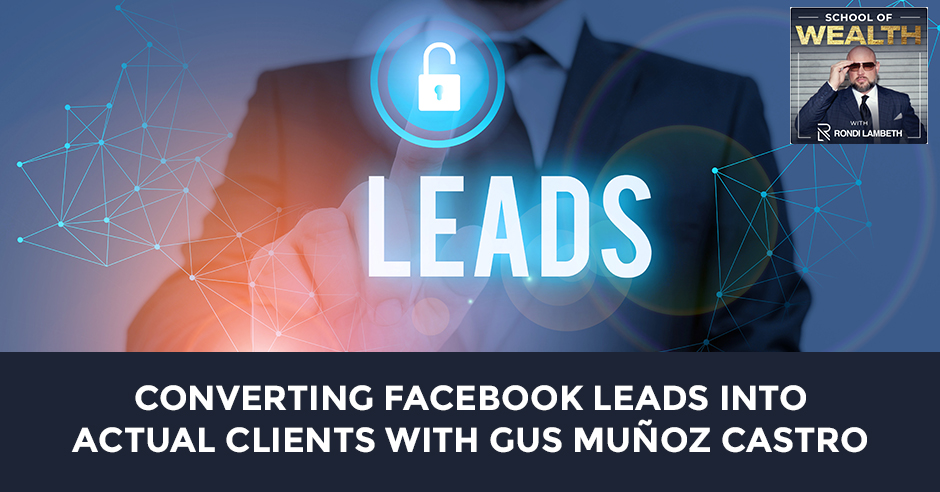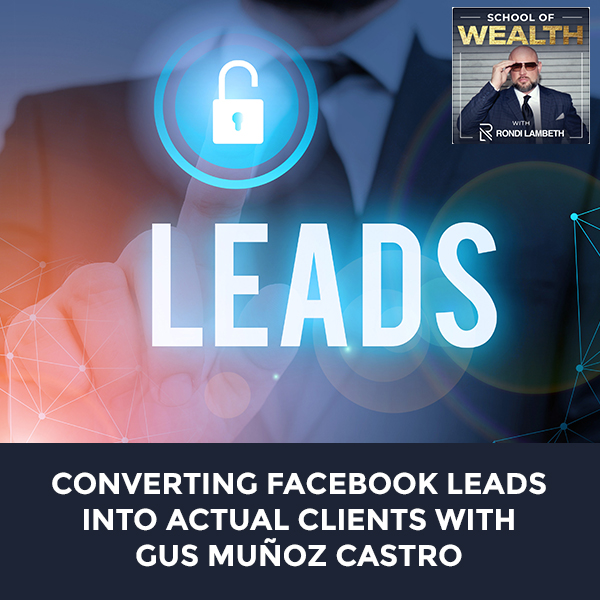
The first lesson you learn from real estate is if you don’t knock on doors, hit the phones, and talk to people, you’re not going to get any business. When you’re starting, no one knows and no one cares you’re an agent, so you’ve got to find a way to generate that business. On today’s show, Rondi Lambeth brings on Gus Muñoz Castro to talk about how you can convert leads into actual clients. Gus is a Facebook conversion expert who helps companies throughout the United States convert Facebook leads into actual clients. Gus also emphasizes the importance of building relationships through following up, educating, and providing value to people to the conversion game.
—
Listen to the podcast here
Watch the episode here:
Converting Facebook Leads Into Actual Clients With Gus Muñoz Castro
I have a guest on the show, somebody that you are going to want to pay attention to. This guy is a Facebook conversion expert. He sits down with companies throughout the United States and helps convert Facebook leads into actual clients. It’s my honor to introduce Gus Muñoz Castro to the show.
—
Welcome, Gus.
Rondi, thanks for having me on the show.
You came across my show looking for real estate investors and a successful podcast. You reached out and asked if you can come to the show. I read your bio. I was impressed. I was like, “Let’s have you on here.” Tell us about yourself, your background, how you got started in this as an entrepreneur. Were you always an entrepreneur or were your family an entrepreneur? Tell me your story.
By training, I’m an engineer. I grew up in Mexico. I was born and raised on the border with California which is why I have a Southern California accent. I went to school in Mexico and I got recruited to work for Microsoft. I grew up near the US, my family was in the US, but I was not born in the US. I wanted to go there like, “This is the big leagues.” Everything I did was like, “How do I go to America? How do I make it in the big leagues?” I got recruited out of school. I was a straight-A student all my life and 100% pleased everybody. I got all the awards and I got to go to Microsoft in 2004. I stayed there for about ten years until I realized that’s a great dream, it just wasn’t my dream. That’s a great position.
With my insurance and tax-free retirement business, I got in this circle with people from Mexico that are engineers for Microsoft. It’s dozens of them and some of them barely speak English. Is Microsoft actively recruiting people from Mexico to come work for them?
They’ve been doing it for several years. They used to do it in my school in Mexico, one of the top schools, but now they go everywhere across the country. You guys had a huge shortage of high-level, high-tech engineers out there. They’re willing to go to small towns in Mexico to find us.
You realize after ten years with Microsoft that that wasn’t going to cut it.
I love the company. I love having that career path that I wanted to achieve and I was hungry but at a certain point, a lot of my talents weren’t being used. That manifests itself in a bunch of different ways. Mostly, you’re in a bad mood, depressed and it’s a drag to get the work. If you do that enough times, you either have to suck it in and live with it and go, “This is the way things are.” I can’t complain, I’m making six figures, I have the house, cars and lifestyle.
I’m like, “What is it to complain about?” At the same time in Mexico, there’s a huge war going on. Violence is exploding. Going back home is not an option for me at that time. I go, “I’ve got to find something else to do.” My wife got licensed as a realtor in 2008. She moved up with me to Seattle from Mexico. As soon as she got her work documents, she’s like, “I want to go into real estate.” She’s also an engineer. I’m like, “Real estate?” She goes, “Yes. This is amazing.” This is 2008. The beginning of the explosion of the market.
I remember I had a real estate company at that time. I have two agents in my brokerage.
It was a tough time. My wife was the Rookie of the Year in 2008 and she only closed eight deals. She got into it and had a lot of success as a realtor. All referrals and recommendations. I started helping her. I got my license in 2010. I started being more excited and more motivated to work at this commission-only sales job than at my six-figure corporate job for Microsoft being an engineering manager. At some point, you’ve got to make a decision and go, “Am I going to go with my gut and bet on myself or am I going to go to the safe dream that my parents wanted?” I did not even tell my parents I was making that change until I did the change. I left Microsoft. They were like, “You’re set, son. Don’t do anything. Stay there. Never leave that company and you’ll be set for life.”
The reality was it wasn’t for me. I wanted to better myself and take a bigger chance because I could. We didn’t have any kids. It’s just me and my wife. At that point, we were making $250,000 to $300,000 a year between the two of us, but money does not buy happiness. Money helps, don’t get me wrong, but when you’re unsatisfied and you have the potential to be stuck in that “what if” sentiment, you do not want to be there when you’re old. I knew that instinctively. “What if” is not where I want to be several years from now at all.
I took the plunge into real estate. I started a real estate team with my wife. I ran that for about three years and then I started this company, PowerISA, in 2015. About a year, I went full-time into this new company because I saw it infinitely more scalable. I still have my license in real estate. I still closed deals in Seattle on a referral basis. I’ve got 95 full-time employees in this new company servicing hundreds of clients across the US and Canada and I’ve found something special.
Tell me about what is this Facebook conversion expert business that you got with 95 employees. It’s an international company with hundreds of clients in the United States and Canada.
When you get into real estate and are freshly licensed, you’re like, “I graduated. I signed up with a brokerage.” You know this, Rondi, you ran a team. Agents are like, “Now what?” The first lesson you learned from real estate is if you don’t knock on doors, hit the phones, and talk to people, you’re not going to get any business. Even referral and recommendation business. When you’re starting, no one knows and no one cares you’re an agent, so you’ve got to find a way to generate that business. That’s number one. Real estate is a sales job first and then everything else is secondary. That’s my mantra. That’s what I try to tell people.

Converting Facebook Leads: In the real estate industry, the leads are valuable. Some of these leads are $90,000-paydays. In the right market, this can make all the difference.
I talked to a lot of new agents and aspiring agents. I go, “Gus, what’s the number one mistake people make? What’s the number one priority.” It’s all the same answer. This is a sales job, first and foremost. If you don’t understand that you’re going to struggle and you’ll have an issue. If you don’t treat it as a professional sales job, you’re going to go on that roller coaster of income. “My buddy called me this month and he didn’t call me next month. I had met some great people at an open house this month. I didn’t meet anybody next month. I’m not going to get paid.” That’s what typically drives people out of the industry. I’ve heard 50%, eighteen months in, about almost 70% to 80%, 2 to 3 years in because it’s a difficult lifestyle if you have no stability and regular income.
All of those are sales problems and issues. The number one thing people need to learn how to do to be successful in real estate is lead generation. Where am I going to get people’s names, phone numbers, and emails? From my circle of friends, their friends, my neighbors, their neighbors, internet, or phone book. On some level, those doesn’t matter. You have to find a way that you’re comfortable with, you can work with, and you can afford. That’s the first problem. The second problem, you only had if you’ve solved the first one, which is the lead conversion problem. Number one, lead generation. You’ve got to find a way to solve it. Number two, you’ve got these people’s names, phone numbers and emails. Now what do you do?
There is a process to convert these into signed clients, buyers and sellers. Even if someone is coming to you as the friend of a friend, you still have to convert that lead. You might be able to convert those leads. I would convert my referral recommendation leads at 90% or even higher than that because it was a tight community. People knew me. I was a Mexican engineer from Microsoft. I get to recommend it to the Mexican engineers at Facebook, Google, and Boeing, all these companies. It’s not a huge community, but it’s a tight community. There were enough people to sustain a great business. I would typically do 30 transactions, $10 million to $12 million in volume in a year. I base it on myself and an assistant. It was not a massive business but a nice business that I could just run on referral and recommendation.
I started experimenting with other lead generation sources and that’s where I saw the explosion. Referral recommendation is great, but it’s difficult to scale. Other lead generation sources like online leads, expired, sold by owners, cold calling and door knocking, the only limit is your talent and your time. Your ability to find and train talented people and how many of them can you deploy to those kinds of lead generation sources. That’s what got me to take the deep dive into a role like the inside sales agent which is the role we provide to other teams.
The role of this person is to convert those leads. It’s another way to help teams, brokerages and different offices with that conversion process. The hardest thing you could expect a realtor to do day-in and day-out is to dial the phone. It’s difficult to do. Once they get busy, it’s the first thing they stopped doing, lead generating and lead follow up. They’re like, “I’m busy. I’ve got an inspection. I’ve got to answer that email.
I’ve got an angry client on the phone. I’ve got an angry seller on the phone. I’ve got someone with questions. That loan is delayed again.” There are always a million reasons to not pick up the phone and continue moving the business forward. That’s the first thing people stop and a month later, you’re back in the hole. You’ve got no deals closing right away. You’ve got to pick it up where things left off. That’s why we exist.
I experienced that. I found a little over a $3 million ranch that I wanted to buy. I couldn’t get to the real estate agent. He didn’t even call me back. I called her, I left several messages, and I texted her. She texted back, “We’ll show it.” She never set the appointment. I’m like, “That’s a $90,000 commission on that house.” It’s surprising. I go to these open houses and these are $3 million to $5 million houses that I’m looking at. They don’t write down my name, don’t ask for my email and my phone number. It’s mind-boggling to me that they don’t follow up.
They don’t even try. The fortune is in the follow-up. It’s like they have a temperature gauge and they got it set at 88 degrees or 72 degrees. As soon as they make their $72,000 for the year, they turned it down. A couple of months later, they got to turn it back up and now they’re in emergency mode. I even see this with my salespeople where they do well. We were up 400% by August 2020 in sales. My company policy is unlimited vacation time. All my salespeople took most of August 2020 and September 2020 off. It was shocking to me. I went, “I’m hiring new people.” They’re like, “We don’t have enough leads.” I’m like, “We do because you guys took weeks off this year.”
It’s that interesting thing where people have this thermostat and we’ve got to break through that thermostat. I think it’s from chasing their shadow trying to get to it versus turning around. The shadow is like a title like senior vice president or managing broker. Instead of facing the sun and chasing the sun, the shadow will chase you and focus on the core things like making your phone calls, returning the phone calls, following up with people, presenting and spending 80% of your time on the follow-up. I’m assuming what you do is you have a team of inside salespeople that convert for companies.
Our focus is on real estate like real estate agents, real estate teams, brokerages, and investors. We don’t do a bunch of other industries because this is the industry that I know that I can train my people at the best and do their job at the highest level. In this industry, the leads are valuable. Some of these leads are $90,000 payday. This is a crazy story because in the right market, this can make all the difference. One of our clients owns one of the big Facebook groups in real estate. He has a team in Malibu and Venice Beach in Los Angeles, some of the highest-priced real estate in America, in those areas.
He buys online leads. He had one of our ISA working with them, calling people up and setting appointments. They keep following up with them and then three months later, they’re like, “I want to put an offer on this property.” It was a $2 million or $3 million property. They go in, he loves it, and he goes, “What about the home next door? Is that for sale?” They’re like, “It’s not. Do you want me to find out? Do you want to go into contract in this one?” “Yes, but I want both.” Long story short, they close on both deals. They get two homes under contract. Million-dollar homes, both of them. You can do that off of online leads in the right market. The process is the same. The process, skillset and discipline you need are similar to a million-dollar property or a $200,000 ranch in the Metroplex in Dallas. The skillset and the process are the same.
I have a friend that wanted to see a house. He was interested in this house. He called his buddy who’s a realtor, “I want to see this house.” He’s like, “I’ll set it up for you.” He never followed through. My buddy drove over there. He called the realtor that was listing it. He bought it. It’s a $30 million house in Laguna. He sold his house for $28 million and bought a second house for $30 million in Palm Springs. In a matter of 45 to 60 days, he bought and sold $90 million of real estate. The agent never called him back. It’s mind-boggling. I’m a realtor. I have internet leads. If someone reaches out, your company then will call that person, set an appointment, and convert that to a potential client. Is that what you guys are doing?
We have a couple of different ways we do that depending on where you’re at in your business. If you have a team, leverage and people, we place one of our full-time people virtually within your team. We call that the dedicated ISA, dedicated plan. We have other realtors that are not at that level yet that don’t need a full-time person. They’re a part-time person. We even have pay-per-lead options. If you’re only generating 50 to 100 Facebook leads a month, or Realtor.com, Zillow leads, or Google leads, send us those leads and we’ll call them. You’re not going to get a dedicated person that’s a team but we’re helping you make those calls because every single one of those leads is valuable.
I wish what you said was the exception. Unfortunately, it’s the rule where follow up is not happening. Sign calls get missed, informational calls don’t get returned, the open house leads they don’t get called back and followed up with. It’s rare. It’s the exception. Internet leads have the best experience, the ones off the Zillow’s and the Realtor.com in most markets. In Zillow, 50/50 you’re going to get a call back in a lot of markets. I test this. I’m going to call 3 or 4 homes and I’m like, “I’ve got a question.” I’m going to call off Realtor.com or Zillow and see who has any system to follow up with. Those are high intent leads and valuable leads. I know realtors are going to hate me, they might get charged for that. Don’t hate me out. I don’t do it often. It’s a 50/50 that you’re going to get a follow-up. The ones that do call, they’ve got the automated text messages. They’ve got the full shebang. You’ve either got massive amounts of follow-up or people have zero. It’s very little in between.
We generate tens of thousands of leads a month online. We find and attract everything. Off the cuff, I’m going to guess that it’s 90% of the people never pick up the phone when we call them. We only talk to 8% to 10%. Do you find that with them? When you fill out a lead form for me because of TSR and I’m a credit repair company, you’ve got to fill everything out, you’ve got to check the box, then you’ve got to hit acknowledged. It’s not like they just click a button. It’s an extensive form that they fill out.
Those are the leads that you get and the marketing product is a long-form.

Converting Facebook Leads: The people who will win big long-term have that multi-year vision where every year is a new opportunity to convert the leads.
Those are long-form leads. When they click through a second time, it says, “Do you give us permission to use an automated dialer to call you because of TSR and TCPA?” There are little clauses inside those regarding credit repair companies. We’re compliant with these laws. Ninety to ninety-two percent of them never pick up the phone. Do you find that with these realtor leads that when you do call them, they answer the phone?
I see a big difference in the conversion rate and the contact rate between short-form, easily sent leads, low intent leads versus the long-form. With long-form, you can see 2 or 3 times the conversion rate. Let’s say on the first day or two, they’re not going to pick up right away or 80% are not going to be responsive immediately, what does your follow-up plan look like? You guys call them right away, but what happens the next day, next week and next month?
We call our clients or leads one time.
That’s consistent with what I’ve seen, 90% are not going to pick up on the first call.
Eighty-eight percent of the people who hire me do it in the first phone call. We used to call them ten times. Three percent of the people will hire me on the second call and then it goes down from there.
It is relatively low converting.
I’m going to call them one time. Eighty-eight percent of the people are going to hire me on that first phone call. From there, we will text them and email for the rest of their life.
You’ve got some follow-up system in place.
Until they opt-out or buy, buy or die, they’re getting something from me constantly. It’s mainly an educational series like educational videos and educational text messages. It’s about 20% of the clients that hire us. It’s outside of that. Twenty percent of the twelve percent come from those text messages and it could take 5 to 7 years. It’s shocking how long it takes people to hire us. Our clients don’t want to hire me. They have to hire me because they got turned down for the mortgage. They have to in order to get their house, car or whatever it is. It’s 20% of that 12% will come through a text message campaign.
You have a funnel, you understand it, you’ve analyzed it and you have metrics around it. You’ve done your homework and you’ve decided that that follow-up plan makes the most sense, it gives you the highest return. Real estate is a bit different. People want to buy homes. It’s an aspirational thing. It’s a part of the American dream. There are all these aspects to it. Interest rates are low. There are a lot of opportunities for people to buy. There’s also a pandemic going on. You’re an investor, you’ve seen this in a lot of markets. They’re the hottest they’ve ever been. The conversion rate is still low on these leads. No doubt.
It’s not going to be the 10%, 15%, 20% conversion rate but even a 1% conversion rate, given the cost and ROI involved is a massive win. One percent conversion rate for my clients is potentially a 10x return. If they have anywhere near what you have, Rondi, like a multi-year funnel, not a multi-month funnel, which is what most of them do have, all of these returns compound. If you have any way to follow up, educate, and provide value to people, even if you’ve never spoken to them, those things matter, but it accumulates over time. Few people are going to convert over email.
They’re going to say, “I want to hire you as a realtor,” over email but they will remember you over email. Your name will be familiar over email. When the time is right, they might pick up the phone and give you a call or respond to that text message. You have to have a long-term mindset. It is a long-term conversion game. My company helps with that initial part of it. Those first 10, 15, 20 phone calls, but the people that are going to win big long-term have that multi-year vision where every year is a new opportunity to convert the leads, not just the ones that came in yesterday, but the one that came in last year.
My mom sold her house for $450,000. The buyer never saw it. He looked it up online and submitted a full price offer.
It’s like a virtual tour?
He just wanted the land. My mom wouldn’t let the realtor come and take pictures of her house. She didn’t want the interwebs to have pictures of her house and the government to know what was going on inside of her house. They bought it site unseen. They had their realtor go out, FaceTimed them, showed him the outside of the property, the sunset and the mountains. They’re like, “Full price offer cash.” It was closed.
It’s interesting how technology has changed. I want to see your opinion. I think realtors will be out of business soon. The only saving grace they have is they control the MLS. I think of a company like Amazon comes in and now has a Zillow-like MLS with financing, title and appraisals, there will be no reason for a transaction coordinator is what most realtors do. The realtors that build relationships will thrive and be extremely successful but 80% to 90% of the realtors will be wiped out. It’s a transaction. What say do you have on that?

Converting Facebook Leads: Facebook couldn’t care less about how much money you spend with them. If you do something wrong, they’ll kick you off the platform.
This is a hot button issue in the industry. It has been for several years. A lot of smart people are not saying the same thing you’re saying, Rondi, but they’re saying things are going to fundamentally change in the next 12 to 24 months because of technology and competition. There’s a huge NAR settlement going on about transparency and commissions. The Federal Trade Commission is saying, “How come realtor commissions haven’t changed at all in the last twenty years? That’s the only industry where that’s happened. Why is that?”
They sued the National Association of Realtors. Change is coming. Change is here. We’re going to see the entire industry fundamentally, either because of the disruption from Facebook, Amazon, or all of them. They’re going to point their ammunition and their resources to real estate. Whether that’s going to happen in 18 months or it’s going to happen in a 1 or 2, the change is coming. What you said is important, Rondi. The people that build a moat around their business, that know their clients. Google and Facebook are awesome as a tool. Have you ever tried calling Facebook support and Google support?
We have. It costs us a lot of money.
Do they give you the support that you expect from the amount of money you spend with them? Facebook couldn’t care less about how much money you spend with them. If you do something wrong, they’ll kick you off the platform. That’s nobody’s business. Especially if you’re in a highly-regulated industry, they don’t care. They could not care less. There are advantages to these platforms. They commoditize everything. The internet eats everything. What we have to do as business owners is understand that, see it coming and level up to build the relationship.
Who has a relationship with Google? If there was a better alternative to Facebook Ads, every single marketer and business owner that I know would try them because everyone hates Facebook as a platform and as a customer service organization. It’s difficult to work with. It’s essentially the only show in town for social media marketing. Whoever has that relationship with the consumer directly with the client has a huge advantage, forget the Amazon and Facebook, over Redfin, Zillow buyer direct and Opendoor, all these other competing with realtors for their business.
They’re competing and they’re making inroads. Do you know who they’re not making any inroads with? The teams that have built those relationships. I know a lot of folks in the industry are having their best year ever during a pandemic in real estate. Retail, residential real estate and residential realtors. Even realtors that work in multifamily, one of the best years ever for working with investors as well. The pie is going to get sliced a lot more different ways because the number of transactions in the US hasn’t changed that much in the last several years. It’s going to get split down even further. A big change is coming to the industry. The way to protect yourself is the same way that if Amazon is entering your marketplace, the same way that as any other 800-pound gorilla is entering. You better be closer to the client than they are.
You better know your client better than they do because you’re at a huge advantage given your proximity to the end-user. If you do nothing with that information and proximity, you’re going to go away quickly. If you use it to your advantage because real estate is such a visceral, emotion-driven transaction, process and experience. The highest-level investors see it as a transaction but the consumer, the residential real estate buyer or seller, it’s a massive undertaking. The realtor still has the advantage in that situation even the nature of the transaction. Change is coming but I’m betting on the realtor. They’re going to stick it out longer and survive a bit more than people anticipate. The disruption is coming. It’s already here and it’s only going to get big.
The professional realtor is going to survive. The part-timers that do one deal a year is going to get wiped out with technology. When I buy real estate, we’re buying $10 million to $15 million apartment complexes. There are no emotions or whatsoever. It’s how much rent comes in and how much expenses go out. We’re buying businesses.
“Can I see your pro forma? Show me the rent list.” It’s different. Even their relationships matter but it’s a different ballgame. In residential real estate, it’s passionate.
When this realtor showed me a couple of houses, I went to submit an offer the day before they announced the shutdown in Idaho. I cancel it and we’ll see what happens with this whole thing. I couldn’t get finance anyway because they dropped the stated income loans down to $700,000. They’re back up to $5 million again because of my real estate dealings and my tax returns. It’s a mess. I don’t make any money.
I got to do the stated income or bank statement loans. Emotionally, I wanted the realtor to reach out to me. I wanted that relationship. It was like, “You’re not going to buy this house. I’ll see you later.” The realtors that treat it as a profession and build that relationship are going to stay in business. Let me ask you this. How have you used credit in your personal life to make your personal life better? What have you done with your credit in your personal life? I’ll ask you later about your business life.
My biggest credit operation has been purchasing my first home and then purchasing investment homes. It’s been the biggest difference. I come from a third world country. In Mexico, an amazing residential mortgage is a 15% interest rate. That’s a spanking deal. That’s a solid percent.
You grew up cash is king.
I grew up at the end of hyperinflation in Mexico. There’s no 30-year mortgage on the rest of the planet. That doesn’t exist. This is a US and Canada thing. Everyone else has short-term loans and then you figure out what you’re going to do later. Five-year ARM, six-year ARM, they’re all ARMs. My parents got a six-year ARM thinking they’re going to pay this thing off in twenty years. Hyperinflation kicks in while their payment is fixed for 3 or 4 years. They pay that sucker off in two years because money became nothing then.
I don’t recommend people bank on that ever. It’s a terrible experience. One of the good things was that their mortgage became zero because their buying power became essentially zero. Goodbye fixed-rate mortgage Mexico for 30 years. No one would touch that sucker with a ten-foot pole because of the instability. That’s where I came from. Coming to the US and getting the menu of options, “Do you want to buy with a bit of money? Do you want to buy with zero money? Do you want to buy with this?” All these options we have, it’s a privilege. I see it as a privilege. My biggest source of personal wealth is still real estate. I have a business. It’s a seven-figure business, all these things, but my still personal net worth is mostly in real estate.
My income has been made for my businesses and I take 90% of my income. I only live off of 10% of what I make and I invest 90% of it. That’s the net worth and that’s where it’s growing. I couldn’t always do that. I recommend that you start with 1% and then work yourself up if you can work yourself up. You need to be doing a minimum though of 10%. I set people up with tax-free retirement accounts every single day, at least one a day.

Converting Facebook Leads: Taking out high interest on short-term credit is this vicious cycle that kills a lot of businesses.
Every single plan that I come up with, regardless of age, you have $1 million of tax-free retirement in your fund at age 65, whether you’re eighteen years old or 48 years old if you follow the simple plan. I set one up, the girl is going to start out with $150 a month. At age 65, she’ll have $2.2 million. How can she do that? She’s twenty years old. She’s still in college, that’s why we’re starting at $150 so people got to get started. Back to the credit thing, what have you done with your business using credit and leveraging credit to do some things that you couldn’t have done?
My background is in finance. I didn’t come from an entrepreneurial family. My education on business finances, cashflow management and margins has come from the school of hard knocks. I’ve made every mistake in the book. I’ve almost run my company into the ground 3 or 4 times. I left Microsoft in 2013. I have almost got to zero in my business bank account 3 or 4 times because I’m being ignorant because I was selling. I was being “successful.” Topline revenue was high but the bottom-line revenue wasn’t there because if you’re ignorant, you don’t know what you don’t know.
By making mistakes, I realized when you get credit for your business, it’s for investment, expansion and to generate a return that’s going to beat that interest rate. Essentially, that’s what you should look at as a business owner, “What’s the return I can get on this money?” As a business owner, you can get terms that are favorable. Maybe a 30-year or 20-year term. There’s also short-term credit available to business owners. That’s more interesting. You can get massive amounts of money at a shorter-term rate in 6 months or 12 months. What would I use that money for? Are there any opportunities out there that I can qualify for? What would it be? Is it going to be ad spend? Is it going to be building up a new sales team?
For me, it was making a massive software purchase that I would’ve had to pay for upfront. I did not have the cashflow for it, but I was like, “If I can break this down over twelve months, this is a 4x or 5x return from me. Do it.” Get the line of credit, spread it out over the year, not a lump sum that they wanted and I built up another leg of my business. I was only doing a certain set of services. I built up this huge software platform. Now, I have two legs to stand on. What happens? COVID hits. One of my leg tumbles. I’m still standing. I’ve diversified my business to a certain extent. I get past the initial shock and I’m back in business because I’m not depending on a single source of income. That’s what credit has enabled me to do, those kinds of projects.
What’s your biggest mistake, whether personal or business, with credit?
It all comes down to ignorance. Being ignorant and not doing your homework. That’s the fundamental cause but using it as if it were cash to cover operational expenses and payroll. It could be equivalent to take it out a short-term loan to cover payroll. It’s this vicious cycle that kills a lot of businesses. Taking out high-interest on short-term credit.
If done improperly.
It’s like an assault weapon. It’s like, “Those can be used professionally and a great way to defend the country, or it can be used in a bad way.” It’s not that the wrong person gets ahold of it. I don’t want to say weapons, that’s too strong a word, but I want to see them as a two-edged sword. They can help you and solve many of your problems and use very ignorantly, it can damage and end your business.
I used to own a construction company. We had nail guns and power drills. If you use a nail gun improperly, you can kill yourself. I’ve had subcontractors nailed their hand to boards because they weren’t doing it right, but if you use it properly, you can build a whole house in a few days versus hammer nails which is going to take you a long time. Gus, it has been great having you on the show. Where can people find you?
I’d love to continue the conversation. The best way is my website, PowerISA.com or on Facebook. You realize I’m a big fan of Facebook. You can search me up, PowerISA, you can search that on Facebook, and I’ll pop up and also my Facebook group.
What is your Facebook group?
It’s PowerISA – Real Estate Marketing Mastermind or go to my website, I have a link on there. You’ll be able to find that and that’s a free group to join. Anyone can jump in if you’re interested in talking about marketing and conversion.
I will jump in there. If it’s okay, I’ll throw in some credit tips.
We should do a session where I interview you in that group for my audience. I have realtors and marketers in that group. They’re all business owners. It would be cool if you can share some of those nuggets.
Let’s do that. Get on the schedule and schedule when it works for you. We’ll do a Facebook Live and we’ll jump in there. I will answer any credit question and I will go over the five top things you have to have and do in order to have an 800-credit score. Gus, it has been great having you on the show. As always, share the show with other people. We appreciate that. Gus, thank you for being on.
I appreciate it, Rondi. Thank you, everybody.
Important Links:
- Gus Muñoz Castro
- PowerISA
- Realtor.com
- Facebook page – Gustavo Muñoz Castro
- PowerISA – Facebook page
- PowerISA – Real Estate Marketing Mastermind – Facebook group
- https://www.LinkedIn.com/in/gustavomc/
- https://www.YouTube.com/channel/UCquh-ol1JV4HPsSLYV8Mrdg
- @GustavoMuozCas1 – Twitter
About Gustavo Muñoz Castro
 Gustavo goes by “Gus” for short, to make everyone’s life a little easier
Gustavo goes by “Gus” for short, to make everyone’s life a little easier
Originally from Mexico, he’s a former Microsoft Senior Engineer turned Real Estate Agent turned Inside Sales guru.
Since 2015 he runs one of the largest Inside Sales teams for Real Estate in North America, 65 Agents strong making about 50K outbound dials a day.
Gustavo’s team sets about 100 Appointments with Buyers and Sellers every day, mostly from Facebook leads
He runs a 7-figure a year business and have over 600+ active clients.
Gus is super passionate about helping business owners be successful through online marketing and lead follow-up, team building, sales scripts, online lead conversion and much more.
